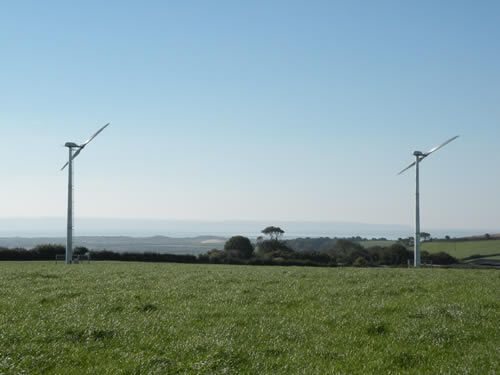
Research conducted by Barclays reveals that more than one in three (37 per cent) dairy farmers in England and Wales are planning to invest in renewable energy projects, with the majority doing so in the next year.
The dominant form of energy generation being planned on dairy farms is wind and solar, with 59 per cent and 55 per cent (*) respectively of those planning an investment saying that this was the form of energy that they were actively considering. There was significantly less interest in anaerobic digestion (9 per cent), biomass (3 per cent) and ground source (2 per cent) projects. Investment was being considered on farms of all sizes, although a higher proportion of farms with larger herds of more than 100 cows expressed interest.
The average planned level of investment is:
Wind £283,000
Solar £182,000
Anaerobic digestion £492,000
Hydro £776,000
Biomass £38,000
Reasons given for investing in renewable energy production include saving money on energy costs (82 per cent), generating income for the farm (60 per cent), becoming more self-sustainable in energy (23 per cent) and reducing carbon footprint (21 per cent).
Commenting on these results, Euryn Jones, National Agricultural Specialist at Barclays said that results from the research very clearly highlight the great surge of interest in renewable energy on dairy farms.
"It is very encouraging that a good proportion of dairy farmers in England and Wales are planning to take up opportunities to develop their business that are provided by renewable energy production. Progressive farmers have always looked for ways of fully utilising resources available to them. Introduction of Feed-in Tariff payments in 2010 generated a good deal of interest in renewable energy and now that a number of projects are successfully up and running, this has given confidence for more farmers to invest."
Of those farmers who are not considering investing in renewable energy, the main reason given was that it would be too expensive (41 per cent). Other reasons given include perceived difficulties in raising funds (19 per cent); projects too complicated (16 per cent); lack of understanding of the sector (18 per cent); and difficulties with planning consent (10 per cent).
Commenting on the reason given for not considering an investment in renewable energy, Euryn Jones said:
"Of those who told us that they were not intending to invest in renewable energy, 15 per cent gave raising finance as the reason. A significant amount of capital is required to fund these investments, however the £100 million fund that Barclays has made available for supporting renewable energy investment provides a very valuable source of finance for such projects.
"It is important that farmers undertake careful research into the technology that they are considering and that they take advice from reputable and experienced sources. Where thorough due diligence has been undertaken and there is a good prospect that the energy can be produced at the level forecast, the Feed-in Tariff payments provide a valuable stream of reliable income to service borrowing that may be required to fund the investment."
The results also show that lack of knowledge of the technology is a barrier for some farmers. 13 per cent said that they ’wouldn’t know where to start’ and four per cent said that they ’did not understand how it would help’.
Euryn Jones said: "A significant minority of dairy farmers may be missing out on an opportunity to generate additional income and reduce costs on their farms due to not knowing enough about the opportunities. There is a good deal of information and advice available and an increasing number of farmers who are experienced energy generators. Whilst renewable energy production will not be an option, or indeed a priority, for investment on all dairy farms, I would encourage all farmers to consider whether such an investment could prove beneficial to their business."
Half of those (50 per cent) surveyed told us that that they didn’t yet know how much energy they expected to generate on their farm.
Euryn Jones added: "I hope this reflects the fact that a number of those interviewed had only started to consider an investment. I would strongly encourage any farmer who is planning an investment to carefully assess how much energy they can expect to produce. This is the critical factor for ensuring that the investment is viable and that sufficient cash will be generated to service borrowing."
